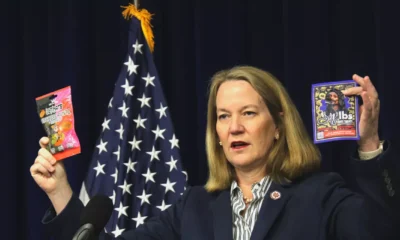director nominations
Arizona’s 2024 Political Landscape: Divided Government Intensifies Oversight of State Agencies and Leadership

In a continuation of political tensions, Arizona Republicans have exercised significant legislative power to counter Gov. Katie Hobbs’ agenda, primarily focusing on her director nominations and the scrutinization of state agencies during sunset reviews.
Throughout the year, Hobbs and Senate Republicans were embroiled in legal disputes regarding her authority to reclassify her director nominations as “executive deputy directors.” This conflict escalated as both confirmed and unconfirmed agency heads faced considerable opposition from Republicans who aimed to either overhaul these agencies or impose strict limitations on their operations.
Following Hobbs’ appointment of executive deputy directors in 2023, a lengthy nine-month negotiation unfolded between the governor and Senate President Warren Petersen, R-Gilbert, to facilitate confirmation. During this period, a Maricopa County Superior Court judge ruled against Hobbs, affirming Petersen’s claims that her approach was unlawful. Subsequently, Hobbs sought intervention from the Court of Appeals.
Ultimately, an agreement was reached where Hobbs committed to appointing new nominees in place of three controversial figures: David Lujan (Department of Child Services), Karen Peters (Department of Environmental Quality), and Dana Allmond (Department of Veterans’ Services). Even so, these individuals retained their roles as deputy directors while 16 other nominees were renominated to the Senate.
Following a Republican majority expansion during elections, Petersen reappointed Sen. Jake Hoffman as chairman of the Committee on Director Nominations. Both Hoffman and Petersen signaled their intention to conduct a review process similar to the contentious one that transpired in 2023.
“We invite Katie Hobbs to propose qualified, nonpartisan nominees that we can approve,” Hoffman declared after reassuming his committee leadership. “What we refuse to do is approve nominees we deem unqualified.”
Will Humble, former director of the Department of Health Services, emphasized the Senate’s unique opportunity to assess these nominees, given their prolonged tenure in agency leadership roles. He expressed hope that the upcoming hearings would prioritize substantive evaluations rather than trivial matters.
This ongoing battle has also seen state agency heads confronting legislative Republicans regarding the duration of their statutory extensions. Typically, agencies that comply with Auditor General recommendations post-sunset review receive extensions of eight to ten years. In contrast, some Republican lawmakers proposed reducing this duration to two years, citing the need for increased legislative oversight.
Within the Republican Freedom Caucus, members like Senators Anthony Kern and Hoffman argued for shorter continuations. Meanwhile, Democrats accused them of politicizing the sunset review process, and the Auditor General’s Office voiced concerns that such a reduction could hinder audit completion due to resource constraints.
Efforts to dismantle the Commerce Authority emerged following revelations that the agency used state funds to attract investments through events like the Super Bowl. However, only one agency received a two-year extension this session, while most other agencies were continued for eight years, with a few taking four or five years.
Humble dismissed the notion of weaponization, characterizing the discord as a natural consequence of divided government, and pointed out that vigorous oversight is often absent during less contentious periods. He supported the idea of closer scrutiny of agencies but stressed the necessity of adequate funding for the Auditor General’s Office to conduct regular audits effectively.
“The more frequently agencies are audited, the more comprehensively they can be overseen,” Humble noted. “It remains to be seen if the Freedom Caucus will support this approach with the necessary resources.”
With Democrats facing electoral setbacks in November, the political landscape indicates that divided government will persist through Hobbs’ remaining two years in office, ensuring continued disputes over director nominations and sunset review processes.


















